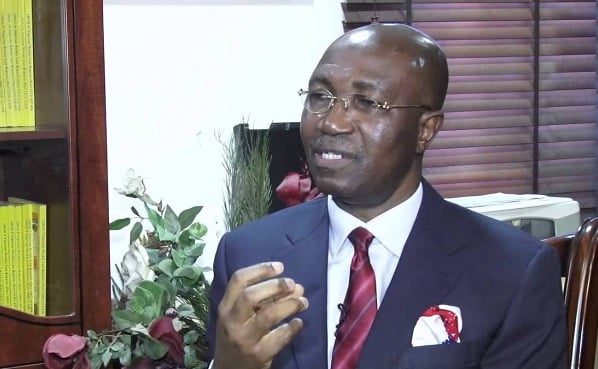A former President of the Nigerian Bar Association, Chief Wole Olanipekun (SAN), has urged the National Assembly to suspend further amendments to the 1999 Constitution of the country.
The legal luminary said the country required a new homegrown constitution that would genuinely reflect the collective will of Nigerians and their uniqueness instead of another round of patchwork reform.
He said, “The National Assembly should, for the time being, stay action on the ongoing amendment or any further amendment to the 1999 Constitution. This constitution needs a new rebranding, a complete overhaul, a substitution altogether. It has to be a negotiated document that will pave the way for a new social order”.
Olanipekun spoke on Monday while delivering the 13th Convocation Lecture of Afe Babalola University, Ado Ekiti, titled “Nigeria yesterday, today and tomorrow: Imperative of a sober and definitive recalibration”.
He argued that the 1999 Constitution, which he described as a “military albatross”imposed on Nigerians, had outlived its usefulness and legitimacy.
The senior advocate said that he had, since the 1999 Constitution was midwifed and became operational under the General Abdulsalami Abubakar military regime, been part of the vanguard advocating a people-oriented constitution that would emerge from public participation and referendum.
Olanipekun recommended a transitional phase between now and 2031 to allow Nigeria to gather, review and harmonise previous constitutional efforts, including the reports of the various conferences and committees on restructuring, ahead of the drafting of a new consensual document.
“During the transitional period, elections will still hold and the winners will serve their terms, but with the understanding that come May 29, 2031, Nigeria will operate under a new constitution, a new structure and a fresh dawn.”
Olanipekun also canvassed the conduct of a national referendum, describing it as “a solemn act by which a people collectively speak in unison to decide matters of grave national importance.”
The legal luminary, who said referendums were not alien to Nigeria’s political evolution, said that sovereignty, as enshrined in Section 14(2)(a) of the existing 1999 Constitution, resided in the people, who therefore had an inalienable right to determine how they wish to be governed.
He advocated a reconfiguration of Nigeria’s federal structure, noting that the states, rather than the Federal Government, should determine the structure and governance framework of the country
He said, “The fact remains, and this fact stares us in the face, that the states appear to have lost their grip and gravitas on their traditional and constitutional jurisdiction and areas of influence with a federal system.
“Surprisingly, although not unexpectedly, people are still clamouring for the creation of more states. It is submitted that it is not the more the merrier, but that the more states are created, the more weakened the so-called federating units become, and the more imperious the centre.
“It is now time for the federating units to take charge of the configuration, repair and re-engineering of Nigeria for stability in all forms, including but not limited to security, constitutional architecture, and form of government.
“It is the referendum, rather than the National Assembly, that will decide whether or not Nigeria needs a National Assembly and if yes, whether full or part-time; their tenure, remuneration, tenure, among others.
“In other words, this National Assembly cannot act at that referendum since one cannot be a judge in his own case. It is the federating units that will make arrangements for the referendum being suggested; how it will be held, through which means it will be held, what the parameters will be”, he added.
The legal luminary also expressed concern about the lack of ideology among the country’s politicians and the wave of defections from one political party the another.
The senior advocate said, “To calibrate our democratic system, a note of caution should be sounded against the wave of cross-carpeting from one political party to the other. Sooner or later,it will inflict implosion and explosion on their host political parties. Membership in a political party should not be a tea party or picnic, but a serious business.
“There should be fidelity to policies, ideas, programmes, manifestos, philosophy, principles and ideology. That is what operates in stabilised democracies in the world.”
Olanipekun urged Nigerian politicians to take a cue from President Bola Tinubu, who has maintained a single party, despite being in opposition for years and built the party to winning ways.
He said, “Aside from him (Tinubu) and a few tiny minority, most politicians in Nigeria have, since 1999, been migrating and shifting grounds along political parties and divided with ease and convenience, to be liberal with them.
“Even as a sole opposition governor, he (Tinubu) challenged and withstood the onslaught of the then party in power at the centre, the Peoples Democratic Party, and has since remained within the phylum of what is styled ‘the progressives’ in Nigeria. Several others have done otherwise.”
Olanipekun, who said Nigeria must stop parading people but strive to produce citizens, lauded Tinubu for reintroducing the old national anthem.
According to him,to reconcile the differences in the tribe and tongue in the country, “we have to be deliberate, sober and reflective and take steps that will lead to a recalibration of our country”.
In his remarks, the ABUAD Chancellor, Aare Afe Babalola (SAN), hailed Olanipekun for the “well-researched” convocation lecture, which he said was consistent with his (Babalola’s) advocacy for the country to have a new constitution to set the stage for the country’s overall development and growth.
punch.ng
FOLLOW US ON:






























